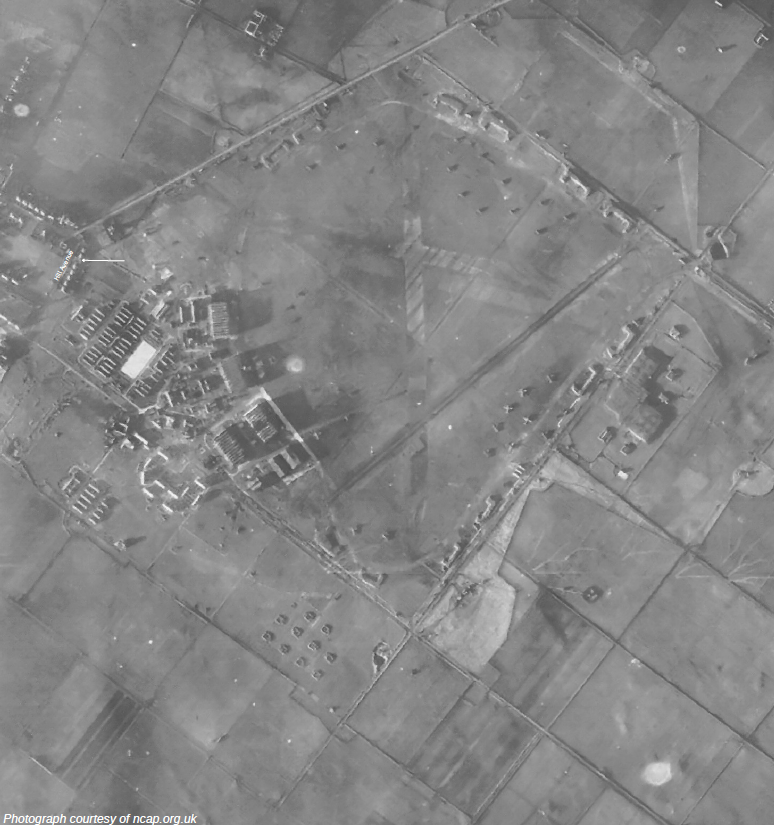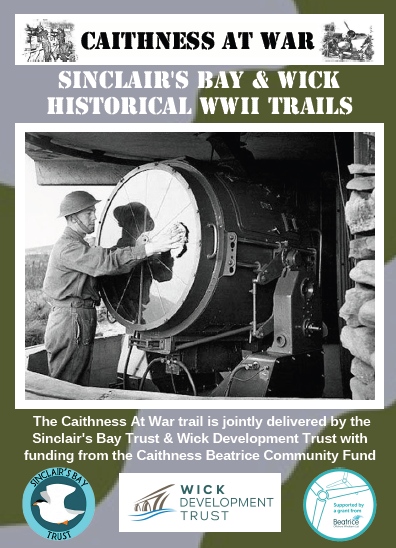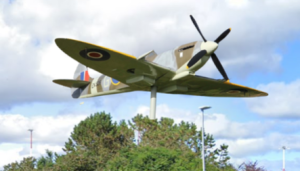Site 10. Hill Avenue Bombing
On Saturday the 26th of October 1940, two German Heinkel He111 bombers approached the decoy airfield at RAF Sarclet near Thrumster at around 6pm which they had mistaken for the strategically important airfield at Wick. The decoy airfield at Sarclet had tricked the enemy several times resulting in bombing raids there rather than Wick airfield.

As the bombers were preparing to drop their bomb loads on Sarclet, it is thought that they spotted the four huge camouflaged C1 hangers on the horizon which gave away the real location of the Wick airfield.
As the aircraft swooped low over Wick the town was once again caught by surprise. The bombers strafed the streets with their machine guns and dropped over 20 high explosive bombs on the airfield destroying one Lockheed Hudson, damaging one of the hangers, and cutting the telephone lines to the RAF base. Unfortunately, seven bombs fell short and a bungalow in Hill Avenue received a direct hit and other houses were seriously damaged. Houses were also damaged in Roseberry Terrace, Henrietta Street, and George Street, with plaster and ceiling work damaged in about 140 houses in total.

The white arrow on the photograph shows the gap where the house on Hill Avenue stood.
The Bignold Hospital was also damaged, and patients had to be evacuated to Lybster School which had previously been converted into a hospital. The effects of the bombs were felt over a great distance with some shrapnel landing 500 yards (460m) away and the nose cone of a bomb crashing through the roof of Lipton’s store in High Street and narrowly missing the manager.
Tragically three civilians were killed and two seriously injured with a further ten suffering minor injures during the attack. The three fatalities and two seriously injured people all resided in the bungalow in Hill Avenue which was directly hit during the raid. Fourteen year old George Cameron and his mother were rushed to hospital in Lybster but sadly his younger brother and sister John and Betty were killed along with their lodger Daphne Dyer.
The following day the police reported that one of the bombs had failed to detonate but it had been located. This raid on Wick was the last to claim civilian lives, but the town’s airfield would see a further four air raids before the war ended.
In 2010 a memorial garden was opened at Bank Row in remembrance of the 18 civilians who were killed in bombing raids on Wick during the war.
In remembrance of those killed on the 26th October 1940
John Cameron, Aged 6
Betty Cameron, Aged 10
Daphne Dyer, Aged 20
The following memories were collected by Hillhead Primary School pupils in 1989 from local people about what they remembered of the bombing on the 26th of October 1940
MR CAMERON
“I had just got the blackout curtains up on the window and as I was the oldest in the family, it was my job every night to shut out all the light in case German bombers could see it and drop their bombs. So the first job was to put up the big black curtains on all the windows. I did that about 6 o’clock and then I thought I would play with my toy aircraft. I had quite a collection of aircraft. My sister Betty was sitting by the fireside knitting and my little brother who was six was playing with his bricks. I was just bringing down my model aircraft to land as if in fun and I heard a whoosh which were German aircraft crossing over our house. We heard a clank or two – some of the bombs didn’t go off. my mother said to us we’d better go in to the lobby where there was more shelter.
We all got up and made our way to the lobby with a young lady Mrs Dyer who was married to an RAF serviceman. She lived with us. Just at that I felt I’d gone to sleep and something dreadful had happened to my body. there was a great big bang and clattering of pots and pans and furniture. I felt myself being flung into the air and when I came down I was only half conscious, but I could just lift my hand to my head., I felt something wet as if it was blood or water – I don’t know what it was. I could smell gas, but I couldn’t hear anything because my ears were punctured with the massive bang. I heard my mother say “Lie still and someone will come and help us in a minute”. It felt like ages before anyone came but I’m sure it was only a couple of minutes before some of the RAF men came down and lifted us and carried us to hospital. I was only semi-conscious and my eyes were shut but I remember being put on a table or a stretcher in hospital and I remember myself shaking quite a bit. i must have looked quite a mess.
The house was badly damaged, all the bricks and stones had fallen down in the blast and scattered everywhere so it was level to the ground. In the blast I had my foot cracked and my legs were holed with shrapnel. all the holes had to be stitched up by the surgeon, then when stitches had to be taken out there was too much flesh growing so they had to burn it off using a special stone called blue stone. That wasn’t just too nice.”
MRS SINCLAIR
“I was with my friend and we were coming along Martha Terrace where the fire station is now. A plane went past and machine gunned the Service Bridge. Two airmen pulled us in beside the Mission Hall. they laid us down and put coats over us. They then put us home to our own home in Vansittart Street.”
MRS ROBERTSON
“We were coming from the Post Office about 6 o’clock on that Saturday night past Crows grocery shop when the planes came low over Wick. They machine gunned the streets. someone shouted to us to lie down. I was with my sister and a friend and we immediately stretched our full length, face down on the steps in front of Crows shop and then we heard the loud explosion of the bombs. We got up and ran up High Street, up past Kirkhill and George Street. as we lived at Bellview Cottage in Robert Street, not far from Hill Avenue. We were so thankful to find our parents sitting up having a cup of tea.”
MRS CAMPBELL
“We lived quite close to Hill Avenue in Henrietta Terrace and I remember the force of the explosion cracked a lot of walls in the area. There was a lamp post that was lifted out of the ground in Louisburgh Terrace”
MRS MILLER
“I was working at the surgeons in Thurso Road. I was cook general there. It was a three storey house and I was up the stairs getting my dirty clothes for going home. I had a bag of Maltesers on the bed and they just rattled with the explosion.”
MRS SUTHERLAND
“I set off with my friend Grace who is now my sister-in-law to walk from Staxigoe to a dance in Ackergill. We were walking to Willowbank at 6 o’clock. We saw these planes flying low, we were right up at Bruce the gardeners where Ann Dunnet’s bungalow is now. Next we knew there were tracer bullets flying at our feet and we knew that it was German planes. We took to our heels and ran back again. We went into the first door that was open which was a little shop owned by Mrs Durrand. We ran in there and there was bairns buying their Saturday night sweets. We shut the door tight and kept them in to keep them off the street because tracer bullets were dancing all over the ground. After, we ran home all the way to Staxigoe. We were terrified. We didn’t know until Sunday morning what damage had been done and that people had been killed”
MRS HOOKER
“I can recall it very well. I was serving a customer with some sweets in Wilfred Weir’s on Bridge Street when the bombs dropped. So I just threw the sweets at her and ran to the cellar. As we got to the top of the steps, the siren went, which frightened us more than the bombs. So we ran down to the cellar which was pitch black. We sat there until the all clear went. We all came up and people came into the shop and told us where the bomb had dropped. We had to shut the shop and walk home. all the things in the shop were thrown off the shelves. We went back on the Sunday to clear it all up. I can also recall my brother was fixing a watch when the bombs fell. All the bits were in a plate and the vibration put the bits flying across the room. We never got that watch fixed.”
MRS BUDGE
“It was just beginning to get a bit gloomy and I was in my house in Willowbank. A letter had arrived from my brother who was in the forces. My father was standing in the middle of the room reading it, and he went and put on the light without pulling the blackout curtains. He was standing there reading when all of a sudden the planes came over the house. They dropped a bomb at the back of our house which didn’t explode. that’s at the top of Barons Well. When the bombs fell we opened the front door and there had been lots of soldiers going down Willowbank. They were all lying flat out taking cover in people’s entries.”
MR MACKAY
“I was at the Pavilion Picture House and there was a lot of RAF servicemen in the Picture House and they told us that Hill Avenue had been bombed. They told everyone to keep their seats. Next day we went down and found a big lump of shrapnel in the bus stands in St Fergus Road.”
MR RICHARD
“I can recall it quite well. I was a telegram messenger boy. I had just come home from delivering a telegram when we heard the planes go past so I went back to the Post Office and I heard the bombs. I was told that Roseberry Terrace and Henrietta Street was bombed and that Hill Avenue was damaged. One of the girls who worked in the telephone exchange belonged to Roseberry Terrace. I went out and cycled up to Roseberry Terrace to have a look to see if it was damaged. I found her house was only slightly damaged but there was considerable damage at the end of Roseberry Terrace. After I had a good look I went back and told her and she was greatly relived to know that there was nobody injured in her family.”


